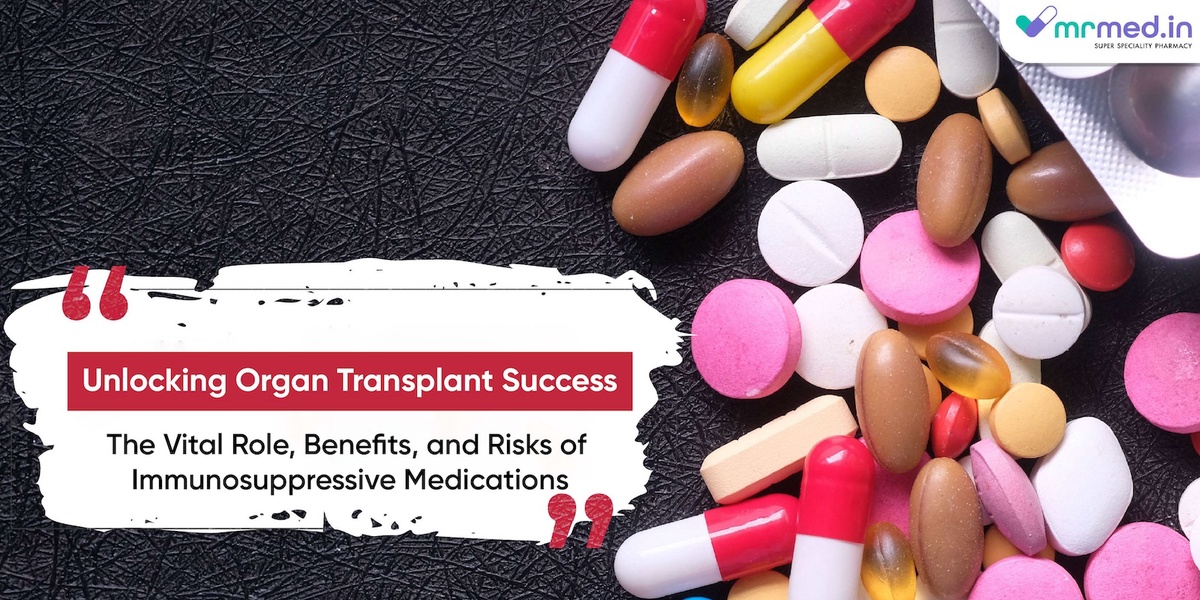Organ transplantation is a lifesaver to improve the quality of life of patients who are at the end stage of organ failure. Initially, rejection of the transplanted organ was a significant hurdle, threatening its early success. Fortunately, scientists discovered immunosuppressive medications that help to soothe the body's immune response, reducing the risk of rejection. Thanks to these medications, the majority of transplanted organs now survive the crucial first year, with success rates exceeding 90%. However, ensuring the long-term health of the transplanted organ remains a challenge that we are still working to overcome. This article discusses immunosuppressive medication's role, benefits, and challenges in preventing organ rejection.
How do you explain immunosuppression?
Immunosuppression occurs when your immune system doesn't work properly, either temporarily or permanently. This can happen due to various reasons, such as diseases or medications. When your immune system is suppressed, it becomes weaker and can't fight off infections as effectively. If this is the case, then why do doctors prefer immunosuppression for organ transplant patients?
Keep reading to find out.
Why do you need immunosuppressive medications during organ transplantation?
During an organ transplant, your body recognizes the new organ as something foreign, something that wasn't originally part of you. In its effort to protect you, your body's immune system goes into overdrive, attacking this new organ as if it were an intruder. This onslaught can cause significant damage and even destroy the newly transplanted organ.
Here is where immunosuppressive medications come in: they act like peacekeepers, calming down this hyperactive immune response. By surpassing your body's natural inclination to attack the transplanted organ, these medications help ensure your new kidney can settle in and function without harm. Essentially, they provide a protective shield, allowing your body to accept and embrace its latest addition rather than rejecting it.
What are the main categories of immunosuppressive medications?
Immunosuppressive medications, also known as immunosuppressants, are classified into four major classes, each with subclasses. Here is a breakdown of these classes:
1. Glucocorticoids:
This class includes medications such as prednisone, prednisolone, methylprednisolone, dexamethasone, and Mycophenolate sodium (such as Myfortic 360mg Tablet).
2. Protein Medications:
Monoclonal Antibodies: These medications target specific components of the immune system and include medications such as rituximab and ofatumumab.
3. Intravenous Gamma Globulin (IVIG):
IVIG therapy typically involves using pooled antibodies from multiple donors. Different formulations and preparations of IVIG exist based on factors like purification methods and donor selection.
4. Protease Inhibitors:
- Calcineurin Inhibitors: These medications block the activity of calcineurin, an enzyme crucial for T-cell activation. Examples include cyclosporine and tacrolimus.
- mTOR Inhibitors: Medications in this subclass inhibit the mammalian target of rapamycin (mTOR), affecting T-cell proliferation and function. Examples include sirolimus (rapamycin) and everolimus.
Why do transplant patients still have shorter life expectancies despite using immunosuppressive medications, and how can we improve this?
Transplant patients often need to take immunosuppressive medications to prevent their bodies from rejecting the donor organ. However, these medications can have significant side effects, like increasing the risk of cancer and infections. Because of these side effects, transplant patients may still not live as long as people in the general population. Hence, they are often supplemented with antimicrobial, antiviral, and antifungal agents, which again have their own risk of developing antimicrobial resistance.
To address this issue, we need newer medications to help the immune system accept the transplanted organ without causing harmful side effects. One way to do this is by promoting "immune tolerance" – essentially, teaching the immune system to be okay with the new organ without heavy immunosuppressive medications.
What are the two ways to achieve immune tolerance?
There are two main ways to achieve immune tolerance: "central" and "peripheral" tolerance.
- Central tolerance works by eliminating harmful immune cells while they are still developing in the body.
- On the other hand, peripheral tolerance deals with calming down these harmful immune cells once they are already in circulation. A promising approach to peripheral tolerance involves using special immune cells called regulatory T cells (Treg cells or CAR T-cells). These cells help keep the immune system in check and prevent it from attacking the transplanted organ.
Parting Words
Organ transplantation has dramatically improved with immunosuppressive medications, but their side effects still impact patients' life expectancy. To overcome this issue, new therapies inducing immune tolerance with fewer side effects are needed. Promising approaches include Treg cell therapy and CAR Treg cells, which help to prevent rejection. By finding new ways to harness the power of these Treg cells, we can improve the outcomes for transplant patients and help them live longer, healthier lives.


No comments yet